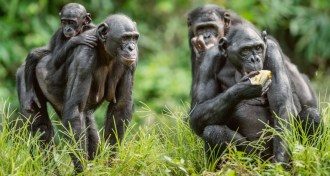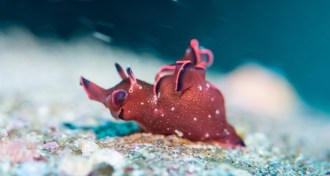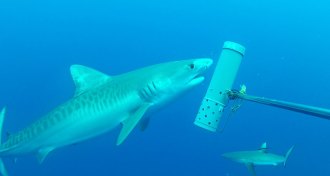News in Brief
-
 Health & Medicine
Health & MedicineKeeping people within U.S. blood pressure guidelines saves lives
Big reductions in heart attacks, strokes and deaths may be possible under 2017 blood pressure guidelines.
-
 Particle Physics
Particle PhysicsDark matter particles elude scientists in the biggest search of its kind
The XENON1T experiment saw no signs of hypothetical dark matter particles called WIMPs.
-
 Animals
AnimalsPregnant bonobos get a little delivery help from their friends
As in humans, female bonobos become helpers for mothers giving birth, data from captive apes suggest.
By Bruce Bower -
 Climate
ClimateAs CO2 increases, rice loses B vitamins and other nutrients
Field experiments add vitamins to list of nutrients at risk from a changing atmosphere.
By Susan Milius -
 Tech
TechFleets of self-driving taxis could be choreographed to cut traffic
Hive-minded self-driving cars could curb traffic congestion and vehicle pollution.
-
 Health & Medicine
Health & MedicineBlack children commit suicide at twice the rate of white kids
The suicide rates for young black kids are higher than those of their white counterparts, a pattern that flips in older kids, researchers find.
-
 Astronomy
AstronomyMaverick asteroid might be an immigrant from outside the solar system
A space rock’s backward orbit could be a hint of unusual origins.
-
 Cosmology
CosmologyThese stars may have been born only 250 million years after the Big Bang
Scientists find evidence that stars were forming just 250 million years after the universe was born.
-
 Neuroscience
NeuroscienceRNA injected from one sea slug into another may transfer memories
Long-term memories might be encoded in RNA, a controversial study in sea slugs suggests.
-
 Earth
EarthSatellite data backs theory of North Korean nuclear site collapse
After North Korea’s most recent nuclear test, two underground cave-ins occurred, possibly rendering the facility unusable, a new study suggests.
-
 Particle Physics
Particle PhysicsThe proton’s weak side is just as feeble as physicists thought
Scientists make the most precise measurement yet of the proton’s weak charge and find it agrees with predictions.
-
 Animals
AnimalsHere’s how to use DNA to find elusive sharks
Hard-to-find sharks that divers and cameras miss appear in genetic traces in the ocean.
By Susan Milius